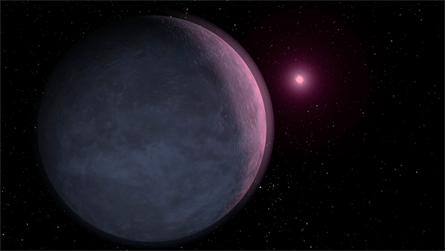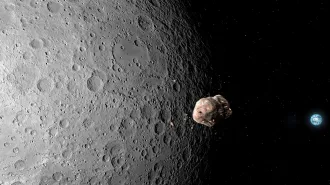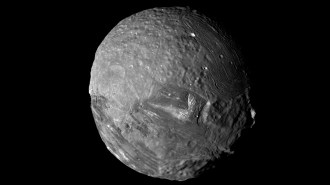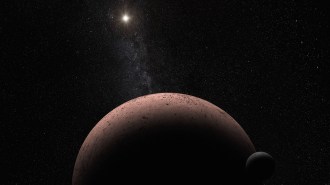Small exoplanet discovered
Detection offers hope for finding other Earthlike bodies
Astronomers have discovered the smallest planet known beyond the solar system that orbits an ordinary parent body. Weighing in at only three times the mass of Earth, the planet orbits its parent body at a distance similar to that of Venus’ distance from the sun. But because the planet orbits a body that is most likely a faint, cold brown dwarf, the planet is probably colder than that of Pluto and could not support life, reports David Bennett of the University of Notre Dame in Indiana.

Nonetheless, the detection is a milestone that gives astronomers additional hope of one day finding an alien Earth similar to home, comments David Charbonneau of the Harvard-SmithsonianCenter for Astrophysics in Cambridge, Mass.
Bennett and his colleagues found the planet because it and its parent brown dwarf acted as a set of gravitational magnifying glasses, separately bending and brightening the light of a background star that happened to lie directly behind the pair as seen from Earth. The two distinct brightenings revealed the presence of the parent body and its planet.
The planet, formally dubbed MOA-2007-BLG-192Lb, lies 3,000 light-years from Earth — too far to allow investigations of the orb’s properties. But large microlensing surveys such as Bennett’s are invaluable for revealing what kinds of nearby stars are likely to have Earthlike planets, Charbonneau says.
Unlike other methods of finding planets, which require that astronomers must wait weeks to years for a planet to complete an orbit about its parent star, the microlensing technique is a snapshot method that gives an immediate answer, notes Charbonneau. Although microlensing reveals planets that are too remote “to determine the basic atmospheric constituents and so on that we really yearn to do,” he notes, the method reveals the probability of finding particular planets around different types of stars and guides researchers in “designing the best surveys to find Earthlike objects 30 light-years away instead of halfway across the galaxy.”
In 1992, researchers found two lower mass planets, but they were orbiting a pulsar – the burned out remains of a heavyweight star.







